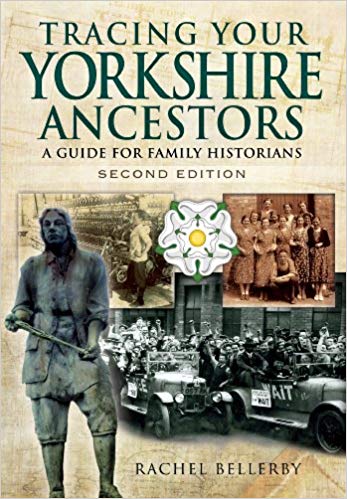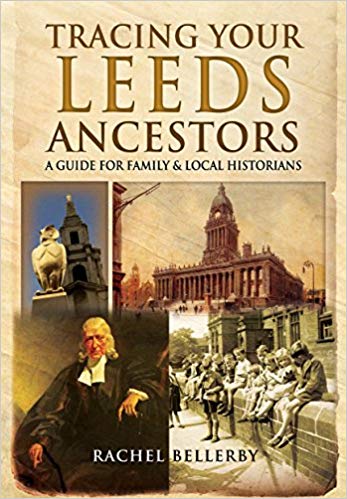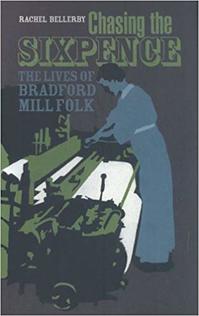|
This month I am delighted to host a guest blog written by Rachel Bellerby who first became interested in family history at the age of ten, after spotting a family tree chart in a Yorkshire mill shop. She says of herself: ‘For as long as I can remember I’ve loved sharing history, and through my work editing History Scotland Magazine and as web editor on Family Tree, I’m lucky enough to be able to share this passion with a wide audience. Outside the history world I spend lots of time exploring the Yorkshire countryside and finding out about the women of years gone by – whether famous or known only to their friends and family, all had their own story to tell.’ Rachel is also the author of 'Tracing Your Yorkshire Ancestors', 'Tracing Your Leeds Ancestors', 'Chasing the Sixpence' and the forthcoming 'Struggle & Suffrage: Women of Bradford, 1850-1950'. She is also, I am delighted to say, the newest member of the team behind #AncestryHour, which was established by myself back in January 2015, to bring together the world of professional and amateur family history. For an hour every Tuesday between 7 and 8 pm, Rachel, myself and other team members, Sylvia Valentine, Michelle Leonard, Fergus Smith, John Boeren and Tara Frugalone host an hour of quick fire ‘questions and answers’ on Twitter, where we (and many other leading professionals) pop in to share our expertise for free. Since it launched #Ancestry Hour has been quoted as ‘… the most valuable #hashtag on the internet for #familyhistory and #genealogy …’ Long may it continue – if you haven’t already joined in the chat why not give it a go! Rachel’s blog is about ways to give back to the hobby you love, which is very much the ethos behind #AncestryHour. It is also most timely given this is the time of year when archives and family history societies are planning their ‘Heritage Open Days’ and on the lookout for volunteers. Events such as these provide a fantastic opportunity to get involved and connect with fellow history enthusiasts in your area. Volunteering can be a very rewarding experience, and many of the projects instigated by local archives also provide the opportunity to learn a new skill for free. In this respect I am a perfect example, the Flodden 500 Project gave me first taste of the art of palaeography. The Heritage Lottery funded document transcription project led by Linda Bankier of Berwick Archive Office, was the inspiration for me signing up to the MLitt post graduate degree course with Dundee University in September 2015. Document transcription is now one of my specialist skills, and yes, a document dating from 1513 relating to the Battle of Flodden forms the basis of my ongoing dissertation. Who knows where giving up a bit of free time could lead you! Anyway, without further ado, here are Rachel’s top ten tips on how you can get involved – even if you live outside the UK. LET GENEALOGY THRIVE! TEN WAYS TO GIVE BACK TO THE HOBBY YOU LOVE - Rachel BellerbyAs anyone who has even dipped their toe into the world of family history knows, tracing your ancestors can be very addictive. Rachel Bellerby of Family Tree magazine has ten tips to help you share your skills and knowledge so that even more people can enjoy family history. 1. Volunteer at your local family history society Family history societies are the lifeblood of the family tree scene and are run by volunteers who give up their time to help researchers tracing ancestors in a certain geographical area. There are lots of ways you could give your time to your local society, including helping to produce the newsletter or magazine, recruiting speakers for meetings, getting involved in one of the society’s projects, or that all-important job of helping with refreshments at society get-togethers. 2. Offer your services as a document transcriber If you’d prefer your work to be home-based, why not volunteer your time as a document transcriber? Usually you’ll just need a PC, e-mail and internet access. Free UK Genealogy (which is a registered charity) currently has volunteer opportunities or you could contact your local family history society. 3. Take a DNA test DNA is becoming an increasingly mainstream branch of family history and the more people who test, the better for anyone who’s taken, or is considering taking, a DNA test for family history. If you do take a test, you can help both yourself and your potential DNA matches if you’ve uploaded a family tree to your chosen family history site, so that both you and your DNA cousins can work out how ( or even if) you’re related. 4. Join a DNA project Once you’ve had your test results back, you’re free to upload your raw DNA data, whether to a DNA project run by your test provider, or to another organisation which accepts data from your test provider. How do these projects help the world of family history? Well, your DNA could provide vital data to projects based on a particular surname, ethnic group, geographical area, or even a particular type of haplogroup. And of course it’s always interesting to follow the progress of such projects and find out how you fit in. 5. Start a one-name study If you have a particular interest in one of the surnames in your family tree and you’re up for a long-term challenge, why not start a one-name study? After registering the surname with the Guild of One-Name Studies (for UK names) you can work at your own pace, collecting instances of your surname where it occurs, responding to enquiries from people researching that surname, and making your research available to other genealogists. 6. Help out at a family history event A great way to meet other family historians is to volunteer your services at a family history event. Up and down the UK, there are hundreds of family history events, ranging from society meetings to genealogy fairs, most of which are run thanks to the hard work of volunteers. You could help man a stand at a fair, offer your expertise as a speaker, or help welcome visitors to events both large and small. 7. Be a genealogy look-up If your research often takes you out and about, consider offering your services to your local family history society. Many society members live far from the area where their ancestors once dwelled and would welcome the opportunity to have a photograph of an ancestor’s grave, or a quick look-up in one of the records held by your society; and you’ll be helping build the society’s coffers, as most people making these requests offer a donation to the society in question. 8. Join a help desk Continuing the above theme, many family history societies run a help desk, either at their premises or at a local library or archives. Both new and experienced researchers will use this service and so if you have a good knowledge of the history of your local area, your insight could be invaluable. 9. Help someone break through a brick wall Most of the large genealogy websites allow you to register the fact that you’re willing to take enquiries from others researching the same family. Helping other people tracing the same line not only benefits others, but may also provide you with valuable information about other ancestors or distant cousins you haven’t yet found. 10. Be open and honest with your research Many of us lead busy lives and your opportunities to volunteer your time and knowledge at the might be limited at the present time. However there’s one way we can all benefit the family history world and that’s by trying our best to keep our family tree notes and findings organised, and being honest about any information which is open to interpretation, or not yet fully verified. Both your fellow researchers and your own descendants will thank you for a well-organised and carefully researched tree! ****** You can follow Rachel on Twitter at @bellerbyrach or you can catch her, and the rest of team on Tuesday's between 7 and 8pm during @ancestryhour.
0 Comments
|
AuthorSusie Douglas Archives
August 2022
Categories |
Copyright © 2013 Borders Ancestry
Borders Ancestry is registered with the Information Commissioner's Office No ZA226102 https://ico.org.uk. Read our Privacy Policy






